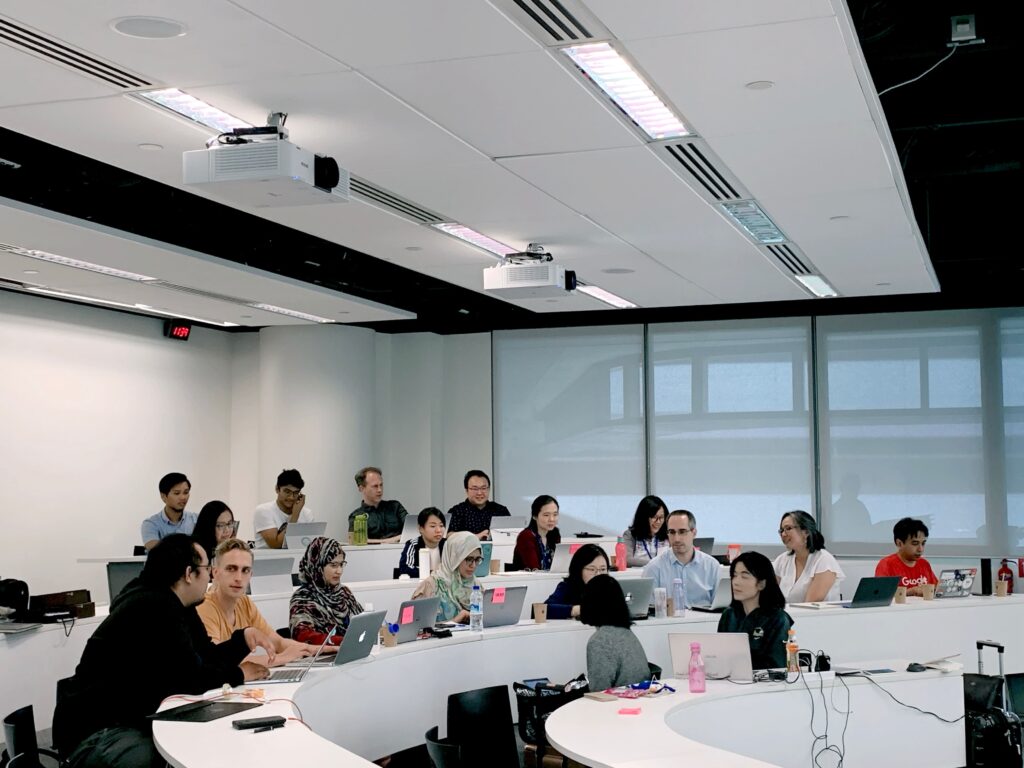We have recently interviewed Professor Zoltán Illés in connection with distance learning in the tertiary sector, and he shared his valuable insights with us. We further analyzed the so-called paradigm shift many experts point out as the ultimate change. In our current article series, we want to continue the topic’s discourse. We have talked to Dr. Mahmoud Alkilani, who is a Chief External Examiner working at Birmingham City University and an associate professor at the University of Applied Sciences and Arts Northwestern Switzerland FHNW.
Dr. Mahmoud Alkilani is a professor in social sciences, in business.
“I used to be the principal lecturer at Anglia Ruskin University in the UK. I was responsible for undergraduate and postgraduate courses at the Cambridge campus. Since 2012, I have not been working in academia full-time.”
How did you become a professor, and based on what motivations?
I started my bachelor’s degree at Anglia Ruskin University. After completing it, I received an international scholarship to do a Doctor of Philosophy Degree (PhD). During my PhD, I started teaching part-time, and I enjoyed it. I felt genuinely passionate about education. In 2006 I became a lecturer and finished my PhD in the meantime.
I was motivated to be a dynamic educator. During my time as a senior lecturer, I developed two courses in response to a pilot study for flexible learning launched by the Higher Education Council Fund. The programme aimed to test how it would work out if students earned their BA honors in two years instead of three. I got nearly 500,000 pounds as funding to research and develop these courses.
Has this pilot study been proven to be very successful?
Now, the purpose of the flexible learning pathway finder is that instead of students spending three years in higher education to get a bachelor’s degree, they can do it in two years, but having trimesters a year instead of the traditional two.
So we squeezed in another trimester in the summer. Normally students finish exams in May and come back in September. So we added one more semester in June, which lasts until mid-August.
Although we were initially unsure about what potential employers would think and whether they would view this as a diluted course, we are now extremely satisfied and the programme is successful due to its condensed nature. This is perfect for students who are really dedicated and who have work experience and joined academia later.
My first cohort joined the top five consultancy companies, which suggests that the top five have approved the course.

Did the idea spread to other parts of the UK?
Currently, about 22 or 25 universities in the UK offer accelerated degree programmes across different disciplines. I felt that I have contributed not only to my university but also, more widely, to higher education in the UK.
Afterwards, I became responsible for all the programmes in the undergraduate and postgraduate courses at the Cambridge campus at Anglia Ruskin University. I was also promoted to principal lecturer and worked in this role for four years.
What happened after those four years as a lecturer?
In 2012, I felt that I needed a new challenge. That is when I joined my family business, a packaging company.
Soon after, in 2015, I reconsolidated my position in university education. I did some more work at the University of Applied Sciences and Arts in Switzerland. However, I mostly work with Birmingham City University and Edinburgh Business School.
We will talk about COVID in the context of the rapid spread of online education, but what other significant changes have you witnessed during your career that shaped academia?
In my opinion, academia is facing many challenges. For the past ten years since I left my full-time academic job, academia has been going through ups and downs. For example, the UK has introduced considerably higher tuition fees.
Now the government has established a grant that students can take to pay for their education. This is good, the grant has zero interest until you finish, but it is payable back after you earn a certain amount of money.
I always thought that education had to be free and available to everyone. Actually, the problem is that the government did not have a very solid mechanism to collect the grants that they gave to the students. That is unfair. If you stay in the UK, the UK government will control your income. They know how much you get, and they collect the money. But if you decide to go to another country to live and work, they have no chance of doing that unless you declare your income.
This challenge has created a gap in the number of students going to universities, and international students have become a more important source of income.
And if we are talking about recent issues and the importance of international students, we need to mention Brexit.
Absolutely. Brexit resulted in the UK being a distant or less favorable place to study. Furthermore, the cost of living is very high.
The dust has not settled, and COVID has created another dimension for these challenges.
There is also more competition. European universities in the last ten years have developed many courses in English. Now, when students ask me where to study, I tell them to choose Germany, Ireland, or other European countries because some of the universities in these countries do not have the same financial pressure as those in the UK. Students get better value for money. Education in the UK is too expensive, and the cost of living is too high as well.
I think we will experience more severe financial issues than we anticipated in the last ten years.
There are so many challenges ahead. Higher education is not what it used to be 40 or 20 years ago. The landscape is changing tremendously and fast. And we should not forget about the lack of proper funding either. As soon as the budget cracks in any country, the first things the government will cut down on are education and healthcare. Look at the challenges facing Germany today, and Germany is the engine – I always call Germany the engine of the European Union. We cannot isolate higher education from the geopolitical environment or the changes in the world economy.

We have talked about the causes of the paradigm shift in education. How can universities adapt amidst such changes?
Whether the change is for the better or not, the situation is more about sustainability and survival. It is no longer about productivity and information. It is about efficiency and functionality.
But there are problems associated with efficiency, right?
For example, the MBA students I teach in Switzerland are all in middle management and have families, and on Saturday, they come and attend an MBA class. They are willing to come to the class, and you can teach them in a cost-effective manner because they are mature. The number of students in a class is small.
However, if you look at undergraduate programmes, I do not think that cost-effective ways will work very well because you still have to nurture the students. You have to push them to do things.
And COVID has added to this because online education completely changed.
The ways and methods of delivering course materials have radically changed. They have changed, of course, in the case of MBA students as well. During the lockdowns, students were frustrated. They want to tell you about their experience. Tell you what they do in their company; tell you how things apply to their role in their company or the job they do. It is more of a practical type of learning because you learn from experience and experience from others.
When you teach online, not all the students can interact. I use different platforms, and I do not think they are the best at the moment. Probably things will develop more in the future, though.
As a result of the move to online teaching, we lost one big element-peer learning. It is gone completely. The second significant loss is the lack of debate and interaction. You ask a controversial question, and you want all the students to start debating and expressing their views- you cannot do this online. The dynamics of the discussion have changed.
Also, COVID has made us antisocial. There are now isolated individuals in the comfort of their homes who do not interact with others. Even primary and high schools are experiencing maddening changes: students log in to their online classes and go back to sleep.
I sometimes hear of the COVID generation students. Will they have the right soft skills to interact and become part of the wider community or not? It will definitely be a big challenge for them and us.

We could also talk about the effect on our communities. Essentially workplaces have also moved online in many cases. If we do not have the right social skills, how will we manage the world’s problems, such as climate change, which would require collaboration, for example?
Correct. I think we have many challenges there and we are going through a roller coaster. It is just that we are not reaching a stable point – a period of no changes. Of course, changes are good, but we also need them to settle down.
You are forced into development by external shocks or external factors that push you. But I believe that we were not ready globally to go online. I cannot see how 400 or 200 or 100 or 50 students, even 30 people in the class could be taught online simultaneously.
What kind of software are you using for education?
I have used WebEx, Adobe Connect, Microsoft Teams, and also Zoom, but for meetings more than for lectures.
These softwares have many good features, and you can break students into groups and initiate discussion among them. But what is this discussion about?
Have you noticed any performance changes among your MBA students?
I think the management of higher education has acknowledged it is a challenging time for students and for academics.
So, the answer to your question would be a “yes,” unfortunately. We have lost lots of elements of education and the education process with COVID, and this has influenced students’ performance and understanding. Personal connections, in the case of MBAs, are also crucial.
I don’t think students’ performance capabilities have changed. But students’ performance largely depends on the situation they are in. If you challenge them, they rise to the challenge. If the environment is not challenging, they relax. That is in our human nature. And during COVID, the environment wasn’t challenging, so students didn’t go the extra mile to develop their skills.
It is not because we did not want to challenge them but because we did not have the infrastructure that would be suitable to do so.
During COVID, students were “present” at home. I like using the word “present” at home because it was not their choice, and they were not allowed to go to the university. They were at home, between four walls, which was very difficult psychologically.

Can you imagine a hybrid system if most people are dissatisfied with the current one?
I don’t think we will change. I think we will stick with the current system because the paradigm shift is clear. Work on the infrastructure of the delivery will continue. In certain places, the hybrid system might prevail for a while, but eventually, we are moving online. A lot of effort is being put into the online infrastructure to make the experience better and supported.
Don’t you think that human nature will be stronger? Essentially, we are social animals.
Moving online is something I don’t like. Why? Because it has adverse social consequences for the young generation. Now they do not talk to each other because they constantly stare at their mobiles and iPads. They don’t have anything to talk to each other about. Imagine universities and schools going online; students will be left with nothing sociable to relate to.
For generations who knew other systems, nothing replaces face to face. But the new generation: they know nothing else.
We see the difference because we are “the transition people.” We know the old system, and we are experiencing the new system, and we don’t necessarily agree with it or like it, but the new generation knows only one system.
The biological need is indeed coded in them, but they will not act upon this. They simply risk becoming an unhappy generation. We can already see that now: more and more people experience depression and anxiety.
What else is changing due to the paradigm shift we have not yet discussed?
Older professors who cannot adapt to the digitized world found the last few years really frustrating and going online a waste of time.
We might lose the best knowledge that we have. These are people full of knowledge, and out of frustration, they are just giving up. These people acquired 40 or 50 years of research studying and developing theories, reaching a road end saying you have to deliver online.
I think we have to deal with a serious matter in terms of university management. They do not recognize this problem at the moment.
Furthermore, if we are talking about the UK, universities will lose a large number of students because students from other countries will not come to the UK to stay in a room and have lectures online. Universities used to be about having coffee with your classmates, going to the library, and having academic discussions.
The new academia will not feel like the old academia. But we shouldn’t lose faith. In everything we do, there is trial and error. There are limitations to everything we do, and we have to make the best of it regardless of the limitations. If we give up, we make it worse.



